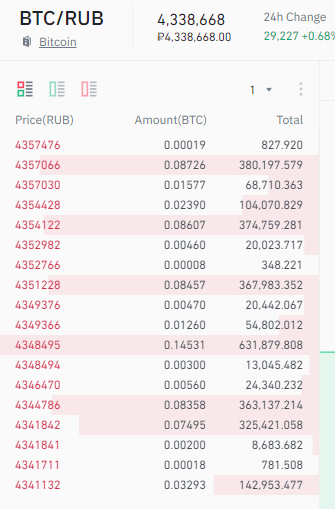You can use a local depth cache to access a current Binance order book in Python at high frequency.
https://github.com/LUCIT-Systems-and-Development/unicorn-binance-local-depth-cache
from unicorn_binance_local_depth_cache import BinanceLocalDepthCacheManager, DepthCacheOutOfSync
import asyncio
import logging
import os
exchange: str = "binance.com"
markets: list = ['BTCUSDT', 'ETHUSDT', 'SOLUSDT']
limit_count: int = 4
logging.getLogger("unicorn_binance_local_depth_cache")
logging.basicConfig(level=logging.DEBUG,
filename=os.path.basename(__file__) + '.log',
format="{asctime} [{levelname:8}] {process} {thread} {module}: {message}",
style="{")
async def main():
ubra = ubldc.get_ubra_manager()
print(f"Starting {exchange} DepthCaches for {len(markets)} markets: {markets}")
ubldc.create_depth_cache(markets=markets)
while ubldc.is_stop_request() is False:
add_string = (f"binance_api_status={ubra.get_used_weight(cached=True)}\r\n "
f"---------------------------------------------------------------------------------------------")
for market in markets:
try:
top_asks = ubldc.get_asks(market=market, limit_count=limit_count)
top_bids = ubldc.get_bids(market=market, limit_count=limit_count)
except DepthCacheOutOfSync:
top_asks = "Out of sync!"
top_bids = "Out of sync!"
depth = (f"depth_cache '{market}' is in sync: {ubldc.is_depth_cache_synchronized(market=market)}\r\n "
f" - top {limit_count} asks: {top_asks}\r\n "
f" - top {limit_count} bids: {top_bids}")
add_string = f"{add_string}\r\n {depth}"
ubldc.print_summary(add_string=add_string)
await asyncio.sleep(1)
with BinanceLocalDepthCacheManager(exchange=exchange) as ubldc:
try:
asyncio.run(main())
except KeyboardInterrupt:
print("\r\nGracefully stopping ...")
except Exception as e:
print(f"\r\nERROR: {e}")
print("Gracefully stopping ...")

